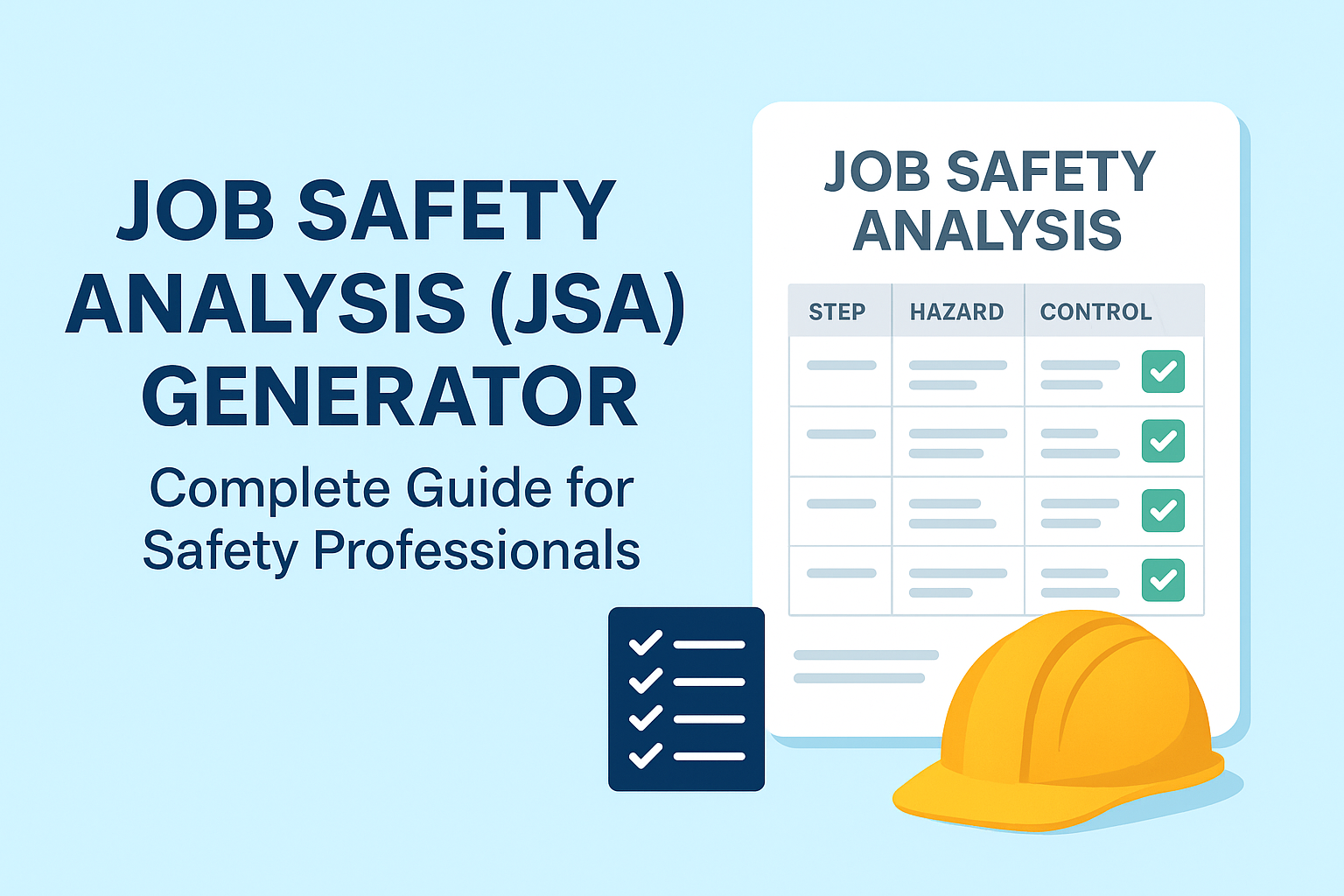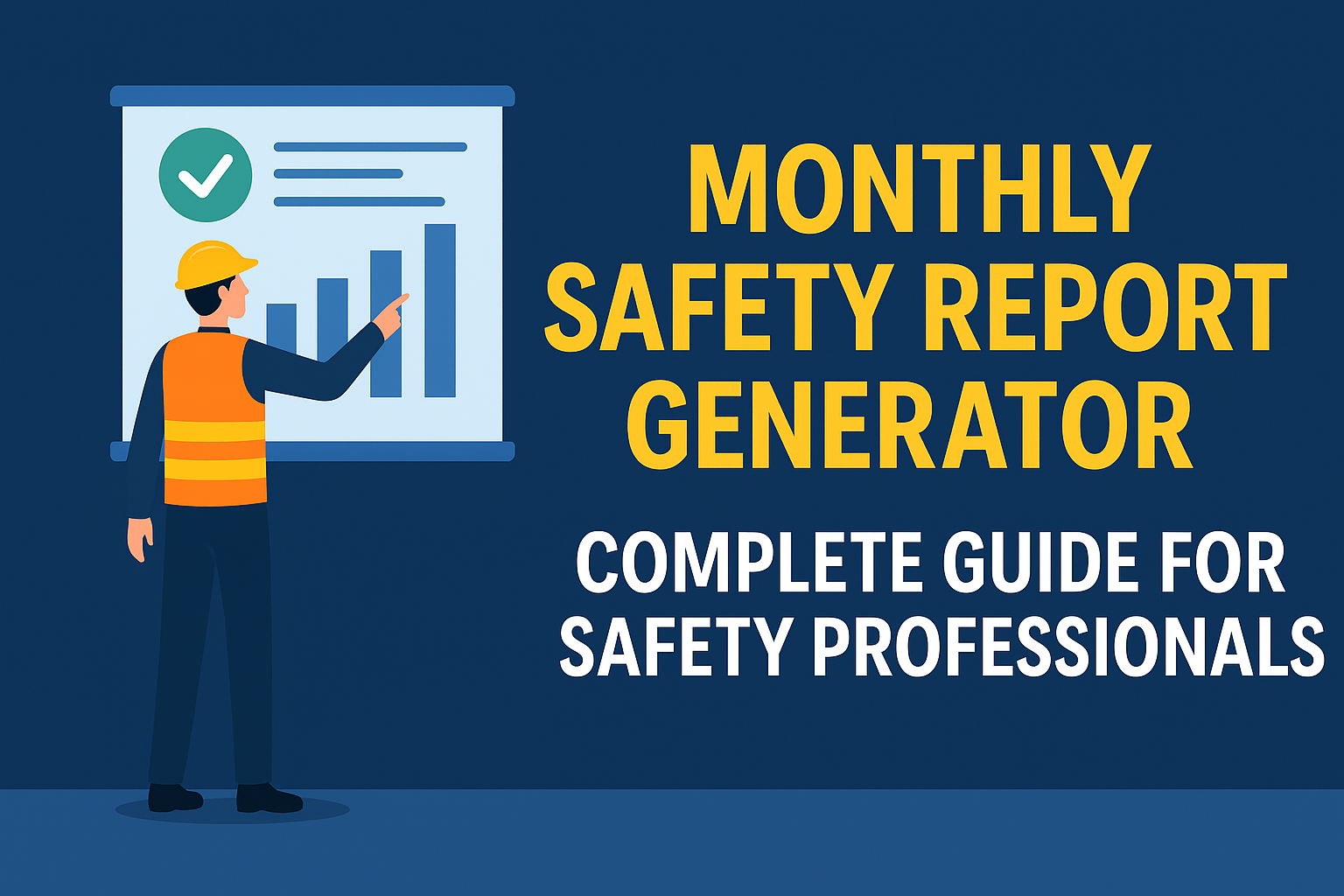
How to Pass the NEBOSH IGC in Your First Attempt: Study Plan + Resources
Introduction to the NEBOSH IGC
What is NEBOSH IGC?
The NEBOSH International General Certificate (IGC) is one of the most recognized safety qualifications worldwide. Designed for people aiming to become health and safety professionals, it opens doors to roles in construction, oil & gas, manufacturing, and more.
Why is it Important for Safety Professionals?
Holding a NEBOSH IGC shows employers you have solid knowledge of health and safety management. It’s often the minimum requirement for job applications in safety roles. Plus, it sets you on the path to higher certifications like NEBOSH Diploma or CSP.
Understanding the NEBOSH IGC Exam Format
IG1 – Management of Health and Safety
IG1 is a theory-based unit focusing on safety management systems, leadership, and risk control. This is assessed through an Open Book Exam (OBE).
IG2 – Risk Assessment Project
IG2 is the practical part. You’ll need to complete a workplace risk assessment and create a report. This simulates real-life tasks safety officers perform.
Open Book Exam (OBE) Explained
The OBE is a take-home exam where you can use your study materials. But don’t be fooled—it’s tough! It tests your understanding, not your copy-paste skills.
What is the NEBOSH IGC Closing Interview?
Once you submit your open book exam, you’re not done yet! NEBOSH has introduced a Closing Interview to ensure the integrity of the assessment process. This short interview helps confirm that the answers you submitted are indeed your own work.
Purpose of the Closing Interview
The main goal is to:
- Confirm your identity
- Verify your understanding of the answers you submitted
- Prevent malpractice or plagiarism
Don’t worry — it’s not designed to trick you. Think of it as a simple, informal chat with your Learning Partner.
Duration and Format
- Time: Usually takes 10 to 15 minutes
- Mode: Conducted online via video call (Zoom, Microsoft Teams, etc.)
- Interviewer: Your Learning Partner or an authorized examiner
What Kind of Questions Will They Ask?
Here are some typical types of questions:
- Can you explain how you approached Question 3?
- What resources did you use to support your answers?
- Can you walk me through the risk assessment section you wrote?
You won’t be tested on right or wrong — just asked to clarify and elaborate on what you already submitted.
Tips to Ace the Closing Interview
- Review your answers before the interview
- Be honest and confident
- Don’t memorize — just understand what you wrote
- Avoid looking at your answers during the call (some partners may ask you not to)
Final Words on the Closing Interview
The closing interview isn’t something to fear — it’s a simple integrity check. If you’ve written your exam honestly and understand your material, you’ll pass this step easily.
Step-by-Step Study Plan for First-Time Takers
Week 1–2: Understand the Syllabus and Objectives
Before jumping in, study the syllabus thoroughly. Know what’s expected from both IG1 and IG2. Download the official NEBOSH guide from their website.
Week 3–4: Deep Dive into IG1 Core Topics
Now start going deep into:
- Risk assessment principles
- Hierarchy of controls
- Safety culture
- Roles of HSE professionals
Break each element down and write your own notes.
Week 5–6: Mastering IG2 Practical Assessment
Observe your workplace or a virtual one. Learn how to identify hazards and suggest controls. Understand the format of the IG2 report early.
Week 7–8: Review, Practice and Mock Tests
Use practice questions and sample OBEs. Time yourself. Review your answers with marking schemes.
Essential Study Resources to Ace NEBOSH IGC
Official NEBOSH Textbooks
Don’t skip the official books—they’re gold. Read them chapter by chapter and highlight key points.
Online Courses & YouTube Channels
Courses from SHEilds, Astutis, or Wise Global Training are great. Also check YouTube for free tutorials and explanations.
Past Exam Questions and Marking Schemes
Practice is key! Use past papers to understand how questions are framed. Follow NEBOSH’s marking criteria to shape your answers.
Study Groups and Forums
Join NEBOSH Facebook groups, Reddit threads, or LinkedIn communities. Ask questions and share resources.
Smart Study Techniques for Success
Active Recall and Spaced Repetition
Don’t just reread—quiz yourself. Use flashcards daily and review older ones every few days.
Mind Mapping and Visual Learning
Draw mind maps to connect concepts. Visual learners benefit greatly from charts and flow diagrams.
Using Flashcards and Quizzes
Apps like Anki or Quizlet can help reinforce your memory with bite-sized learning.
Time Management Tips During Preparation
Creating a Realistic Study Timetable
Block 1–2 hours daily for study. Stick to your routine and don’t overload yourself.
Balancing Study with Work or Other Commitments
Use weekends for longer study sessions. Break big topics into small chunks to avoid burnout.
Writing a High-Scoring IG2 Risk Assessment
How to Structure Your IG2 Report
Your IG2 should include:
- Description of the workplace
- Identification of 10+ hazards
- Suggested control measures
- Justifications for each control
Common Mistakes to Avoid in IG2
- Too few hazards
- Poor justifications
- No proper structure
- Copying examples word-for-word
Sample Template for IG2 Report
Use the official NEBOSH template and keep each section clear and focused.
Here is the official NEBOSH website link for more information:
👉 Visit the Official NEBOSH Website
You can explore course details, resources, exam information, and approved course providers directly from their official platform.
Tips to Tackle the Open Book Exam (OBE)
How to Use NEBOSH Resources During the Exam
Have your books, notes, and NEBOSH guide ready. Use Ctrl + F smartly to find keywords.
Avoiding Plagiarism and Copy-Paste Traps
NEBOSH checks for plagiarism. Use your own words. Understand concepts before writing.
Time Allocation During OBE
You have 24 hours, but aim to complete it in 4–5. Spend time proofreading.
What to Do One Week Before the Exam
Final Review Checklist
- Review summaries
- Attempt mock tests
- Practice IG2 structure
Managing Stress and Boosting Confidence
Sleep well, eat healthy, and take breaks. Positive mindset matters.
On the Day of the Exam: What to Expect
Exam Setup and Submission Guidelines
Check your internet, devices, and file formats. Submit on time and double-check all uploads.
Staying Calm and Focused
Take a deep breath. You’ve prepared well. Trust your efforts and stay focused.
After the Exam: What’s Next?
Results Timeline and Rechecking Process
Results arrive in 50 working days. If you feel your score is wrong, apply for a recheck.
Planning Your Career Path Post-NEBOSH
With NEBOSH in hand, explore roles like:
- Safety Officer
- HSE Supervisor
- Safety Trainer
You can even start preparing for NEBOSH Diploma or IOSH certifications.
Conclusion
Passing the NEBOSH IGC on your first try is absolutely doable—with the right strategy and dedication. Understand the format, follow a structured study plan, and use the right resources. Combine smart techniques with practice and you’ll be well on your way to success.
NEBOSH IGC Career Guide: Jobs, Salaries & Growth Opportunities (2025)
NEBOSH IGC vs OSHA 30-Hour: Which is Better?
30 NEBOSH IGC Interview Questions & Answers (2025)
NEBOSH IGC vs OSHA 30-Hour: Which is Better for Construction Safety?
NEBOSH IGC Scenario on Automobile Manufacturing Safety (Scenario-Based Questions & Answers)
FAQs
1. Is NEBOSH IGC Difficult to Pass on the First Attempt?
It’s challenging but not impossible. With a strong plan, resources, and regular practice, many pass on their first go.
2. How Many Hours Should I Study for NEBOSH IGC?
Aim for 100–120 hours spread over 8 weeks for a solid foundation.
3. Can I Pass NEBOSH Without Attending Classes?
Yes, if you are disciplined and follow self-paced study materials and online resources.
4. What Are the Best Books for NEBOSH IGC?
NEBOSH-endorsed textbooks from RMS Publishing or RRC International are highly recommended.
5. How Can I Improve My Answer Writing Skills?
Study sample answers, understand the NEBOSH command words (like “outline” or “explain”), and practice mock questions with feedback.
























